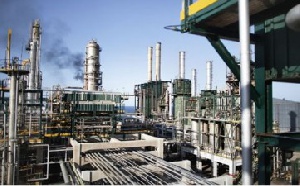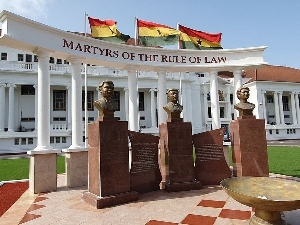- Home - News
- TWI News | TV
- Polls
- Year In Review
- News Archive
- Crime & Punishment
- Politics
- Regional
- Editorial
- Health
- Ghanaians Abroad
- Tabloid
- Africa
- Religion
- Election 2020
- Coronavirus
- News Videos | TV
- Photo Archives
- News Headlines
- Press Release
Business News of Monday, 28 January 2013
Source: Economic Tribune
Ghana gas in trouble
Ghana National Gas Company (GNGC) must account for GHC 20 million it was allocated by the Ministry of Finance and Economic Planning for capitalization and establishment, says the Public Interest and Accountability Committee (PIAC).
The PIAC, required under the provisions of Act 815, to publish a semi-annual and an annual report that gives an independent assessment of the management and use of the country’s petroleum revenues, made this recommendation in its second ever report covering the first half of year 2012.
PIAC, facing financial problems due to government’s failure to release funds for the establishment of its own Secretariat and so continues to rely on international NGOs to fund some of its programmes and activities, noted that parliament has not yet debated the PIAC 2011 Report due to the difficulty of identifying the Parliamentary Select Committee responsible for laying the Report.
Accordingly, parliament has so far not demanded explanations from institutions that failed to carry out their mandates provided in Act 815.
The GNGC, incorporated to build, own and operate gas infrastructure required for the gathering, processing, transmission and marketing of natural gas in the country is up and running.
Presently, efforts are far advanced to develop an appropriate gas processing infrastructure to help commercialize the associated gas extracted from oil production at the Jubilee field.
The GNGC estimates that between 120 and 140 million standard cubic feet per day (MMSCFD) of gas is to be produced during peak production at the Jubilee field.
About half the gas produced from Jubilee is slated to be re-injected into the field to boost oil pressure and production, and for retention whiles the GNGC utilizes the other half as feedstock for thermal power generation and for a proposed petrochemical industry.
In November 2011, GNGC signed a project Implementation Agreement with China International Petroleum Corporation (Sinopec), to construct and complete the gas processing plant.
The project is a fixed price contract to be delivered on turnkey bases with a consortium headed by Sinopec under Engineering Procurement Construction Commissioning (EPCC) Contract.
The project is expected to deliver a fabricated gas processing plant from the Canadian firm, Thermo Design Engineering, while an offshore pipeline installation is to be delivered by Italian firm, Micoperri. A Front End Engineering Design (FEED) for the offshore pipeline will be undertaken by Intecsea/Worley from Australia/US.
Other details of the contract include the FEED for the gas processing plant being undertaken by the French company, Technip France, which produced the performance benchmark for the processing plant.
A detailed engineering design carried out by a US/British firm, J.P Kenny and site inspection was conducted by Ghana Gas Consultants while certification of the pipes before shipment was conducted by Bureau Veritas in June 2012 and Velosi Corporation was consulted to undertake quality assurance inspection of the pipes on arrival at the port.
The GNGC is working with the Ghana Maritime Agency to chart the already installed 14km deep-water aspect of the project.
The PIAC report observed that the Western Corridor Gas Infrastructure Development, comprising the offshore pipeline, the onshore pipeline, the gas processing plant, the NGLs export system, and the office complex is progressing as planned.
The cost of the gas infrastructure project, estimated at US$750 million, is being financed from the US$3 billion loan from the Chinese Development Bank (CDB).
The PIAC report notes that the pre-financing of the main component commenced before first disbursement of the loan, however, the cost of pre-financing was still not known as at the time of preparing the report. It further that the loan is collateralized against the Annual Budget Funding Amount (ABFA).











